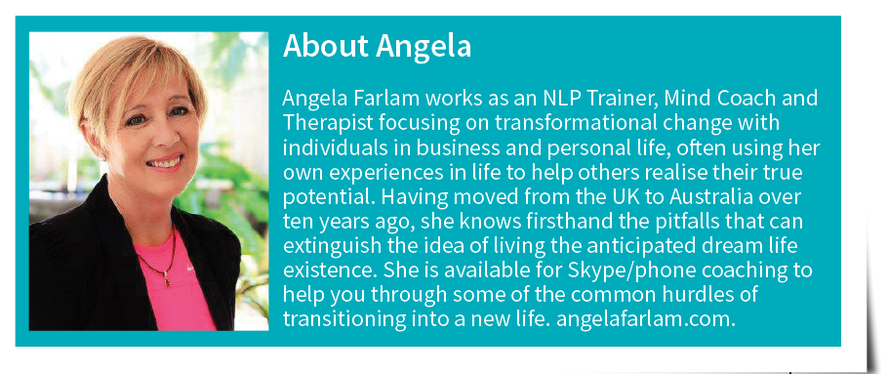“You will find that many of the truths we cling to depend greatly on our own point of view.”— Obi-Wan Kenobi
By Angela Farlam (NLP Trainer, Mind Coach & Hypnotherapist)
| I REMEMBER my mum describing me as a loner as a child, maybe because my favourite pastime for a while was sitting alone, on the wide seat of a wooden gate in our backyard, swinging back and forth, lost in my thoughts. When I look back to that time, I was just enjoying being in the moment, enjoying the sensation of the gate moving as I pushed my feet against the wall. So, I can only assume that when my mum looked at me swinging on the gate all alone, she thought that I must be lonely. Problem is, when mum started describing me as a loner, I took on the same belief – it became part of my identity. |
But as award-winning British actress Maggie Smith famously pointed out, “There’s a difference between solitude and loneliness.” And she’s spot on.
However, while experience has proved to me that the statement my mum made all those years ago isn’t true (I still do love my own company, my own space, and some peace and quiet, but I also enjoy spending time with friends and family, and I love meeting new people for the first time) in times of stress, when my insecure thoughts get the better of me, I can sometimes default back to the little girl who was labeled a loner. And it makes me feel bad.
The good news for me, and also for you, is that when we feel bad or lonely, the feeling is simply an indicator of what we are thinking at that precise moment, in the present, and not about any perceived memory we may have. It’s just that our brains, the supercomputers that they are, always try to attach meanings to a feeling in an attempt to make sense of them. And they’re not always correct.
If somebody comes up with a reasonable reason as to why a particular meaning isn’t true (that you shouldn’t feel a certain way), for example, then your brain will search for a new meaning (a new way to feel based on memory). Even then it is still all a story, an illusion, made up. What we remember isn’t actually what happened.
You see, when I think of the incident of me sitting on the gate, the story my memory actually brings forward is always my mum’s version – a conclusion she came to based on her own life experiences and beliefs. None of it is true, it is all made up, a ‘story.’
The good news is that we can change our story
We can change our identity. Some people believe that identity is a constant. You probably have heard people say, ‘It’s just the way I am.’ And yes, that is their truth at that moment in time. But it doesn’t always have to be that way. People change all the time.
I used to be an anxious person; now that person lives in the past. The old me, for instance, wouldn’t write a magazine article for fear of being ridiculed or seen as ‘getting it wrong.’ That’s because the old me learned the importance of getting things right at a very young age; I saw my older brothers often get into trouble for getting things wrong and I thought, that’s not going to happen to me. I’ll always ‘get it right.’ Bingo! I set myself up for a life full of anxiety, having set the bar too high. I had to be perfect in everything I did, (which is impossible by the way), so I set myself up for failure time and time again.
Until I learned an important lesson.
I am here on planet Earth not merely existing, but also learning, teaching, influencing and being influenced. And the same is true for you and everyone else.
We create our own experience of reality. For example, if you slip on a banana skin, you can choose the role of victim – I am being punished by the universe/why me? – or be a responsible adult and ask, What can I learn from this?
It’s up to you because, what the thinker thinks, the ‘Prover’ proves. If a person thinks they are a loner, the Prover will prove that to be true, and over time the circumstances of the person’s life will come into line with their thinking. This is exactly what happened with me. Until, that is, I learned not to believe all of my thoughts.
Your unconscious won’t make a liar out of you. How many times have your lost your keys and said as you search around, “I can’t find my keys,” and, sure enough, you can’t find them. Next time this happens say, “I can find my keys!,” and notice how quickly you discover them. Just tweaking the way you talk to yourself in your mind can change your life in wonderful ways.
However, while experience has proved to me that the statement my mum made all those years ago isn’t true (I still do love my own company, my own space, and some peace and quiet, but I also enjoy spending time with friends and family, and I love meeting new people for the first time) in times of stress, when my insecure thoughts get the better of me, I can sometimes default back to the little girl who was labeled a loner. And it makes me feel bad.
The good news for me, and also for you, is that when we feel bad or lonely, the feeling is simply an indicator of what we are thinking at that precise moment, in the present, and not about any perceived memory we may have. It’s just that our brains, the supercomputers that they are, always try to attach meanings to a feeling in an attempt to make sense of them. And they’re not always correct.
If somebody comes up with a reasonable reason as to why a particular meaning isn’t true (that you shouldn’t feel a certain way), for example, then your brain will search for a new meaning (a new way to feel based on memory). Even then it is still all a story, an illusion, made up. What we remember isn’t actually what happened.
You see, when I think of the incident of me sitting on the gate, the story my memory actually brings forward is always my mum’s version – a conclusion she came to based on her own life experiences and beliefs. None of it is true, it is all made up, a ‘story.’
The good news is that we can change our story
We can change our identity. Some people believe that identity is a constant. You probably have heard people say, ‘It’s just the way I am.’ And yes, that is their truth at that moment in time. But it doesn’t always have to be that way. People change all the time.
I used to be an anxious person; now that person lives in the past. The old me, for instance, wouldn’t write a magazine article for fear of being ridiculed or seen as ‘getting it wrong.’ That’s because the old me learned the importance of getting things right at a very young age; I saw my older brothers often get into trouble for getting things wrong and I thought, that’s not going to happen to me. I’ll always ‘get it right.’ Bingo! I set myself up for a life full of anxiety, having set the bar too high. I had to be perfect in everything I did, (which is impossible by the way), so I set myself up for failure time and time again.
Until I learned an important lesson.
I am here on planet Earth not merely existing, but also learning, teaching, influencing and being influenced. And the same is true for you and everyone else.
We create our own experience of reality. For example, if you slip on a banana skin, you can choose the role of victim – I am being punished by the universe/why me? – or be a responsible adult and ask, What can I learn from this?
It’s up to you because, what the thinker thinks, the ‘Prover’ proves. If a person thinks they are a loner, the Prover will prove that to be true, and over time the circumstances of the person’s life will come into line with their thinking. This is exactly what happened with me. Until, that is, I learned not to believe all of my thoughts.
Your unconscious won’t make a liar out of you. How many times have your lost your keys and said as you search around, “I can’t find my keys,” and, sure enough, you can’t find them. Next time this happens say, “I can find my keys!,” and notice how quickly you discover them. Just tweaking the way you talk to yourself in your mind can change your life in wonderful ways.
Lost and lonely in a new land
Often when people move from one country to another they miss their personal support group or network. I know I did.
For the first few months I felt like I was on a long holiday and would be going back to the UK. I took on a part time job which helped me to get a sense of belonging, but when my hubby started working, the reality hit; I felt lonely and lost. I missed my friends and family back in the UK, the familiar shops, clothes and food, and I began to yearn for what was familiar.
So what did I do and how might this help you?
I posted a message in the British Expat Group saying how I was feeling a little lonely and lost and asked if anybody would like to meet for coffee. So I established a meet up group and, even though I moved from the area a year later, the group I brought together are still friends ten years later.
The following year, finding myself alone again in a new town, this time I used Facebook, found a local community group, and posted a message. I arranged to meet a couple at Starbucks. My friends and I still joke now about how my hubby thought we might be meeting an axe murderer.
It’s ok for you but I can’t do that
I can almost hear you thinking, and the thing is I did get scared and so will you; getting out of our comfort zone can be a scary thing to do. But when we’re afraid of something and do it anyway, we realise again our fear was all a ‘story’ we were telling ourselves.
You can take small steps when necessary. Going from staying at home and avoiding people to joining groups and being visible can seem like too big a goal at times. So practice on a small goal that seems achievable. Perhaps post an introduction on an expat site, or search through posts and reply to somebody else’s cry for help.
We like what’s familiar, so much so that sometimes people become comfortable with failing to achieve goals. The same can be said for staying at home feeling sorry for yourself. It sure doesn’t feel good, but it may feel familiar and safe. The good news is you can use familiarity in your favour – get comfortable with the small steps, and the bigger ones will follow.
Willingness is the key. Old habits and beliefs can have a powerful hold, but if you really do want to make friends and embrace your new life, ask yourself: ‘Am I willing to do whatever it takes?’ You won’t usually end up having to do whatever it takes, but your willingness lets you know at a deep level just how committed you are.
The best thing you can do is to commit yourself to making friends. Show up at events where you can make new friends. Once you have some success your thinking will naturally start to shift and become more optimistic.
Accept that it might not change immediately. I met a few acquaintances before meeting the group that I now fondly refer to as my ‘family in Australia.’
Loneliness can make people unhappy which can cause them to view the world in a negative light. This is another way the brain is helping to protect you whilst making you feel insecure, unlovable and skeptical. Be aware of your thinking when meeting people; give them the benefit of the doubt.
I sometimes look at our little group of friends with a sense of amusement and I wonder if we would ever have connected in the UK. But I am glad we are friends, and I know that the longer we are friends, and the more situations we help each other through, the deeper the bond becomes.
If you are unable to apply the above understanding or, have been increasingly low in your mood. Book an appointment with a specialist who can give you help and advice.
Often when people move from one country to another they miss their personal support group or network. I know I did.
For the first few months I felt like I was on a long holiday and would be going back to the UK. I took on a part time job which helped me to get a sense of belonging, but when my hubby started working, the reality hit; I felt lonely and lost. I missed my friends and family back in the UK, the familiar shops, clothes and food, and I began to yearn for what was familiar.
So what did I do and how might this help you?
I posted a message in the British Expat Group saying how I was feeling a little lonely and lost and asked if anybody would like to meet for coffee. So I established a meet up group and, even though I moved from the area a year later, the group I brought together are still friends ten years later.
The following year, finding myself alone again in a new town, this time I used Facebook, found a local community group, and posted a message. I arranged to meet a couple at Starbucks. My friends and I still joke now about how my hubby thought we might be meeting an axe murderer.
It’s ok for you but I can’t do that
I can almost hear you thinking, and the thing is I did get scared and so will you; getting out of our comfort zone can be a scary thing to do. But when we’re afraid of something and do it anyway, we realise again our fear was all a ‘story’ we were telling ourselves.
You can take small steps when necessary. Going from staying at home and avoiding people to joining groups and being visible can seem like too big a goal at times. So practice on a small goal that seems achievable. Perhaps post an introduction on an expat site, or search through posts and reply to somebody else’s cry for help.
We like what’s familiar, so much so that sometimes people become comfortable with failing to achieve goals. The same can be said for staying at home feeling sorry for yourself. It sure doesn’t feel good, but it may feel familiar and safe. The good news is you can use familiarity in your favour – get comfortable with the small steps, and the bigger ones will follow.
Willingness is the key. Old habits and beliefs can have a powerful hold, but if you really do want to make friends and embrace your new life, ask yourself: ‘Am I willing to do whatever it takes?’ You won’t usually end up having to do whatever it takes, but your willingness lets you know at a deep level just how committed you are.
The best thing you can do is to commit yourself to making friends. Show up at events where you can make new friends. Once you have some success your thinking will naturally start to shift and become more optimistic.
Accept that it might not change immediately. I met a few acquaintances before meeting the group that I now fondly refer to as my ‘family in Australia.’
Loneliness can make people unhappy which can cause them to view the world in a negative light. This is another way the brain is helping to protect you whilst making you feel insecure, unlovable and skeptical. Be aware of your thinking when meeting people; give them the benefit of the doubt.
I sometimes look at our little group of friends with a sense of amusement and I wonder if we would ever have connected in the UK. But I am glad we are friends, and I know that the longer we are friends, and the more situations we help each other through, the deeper the bond becomes.
If you are unable to apply the above understanding or, have been increasingly low in your mood. Book an appointment with a specialist who can give you help and advice.




 RSS Feed
RSS Feed
















